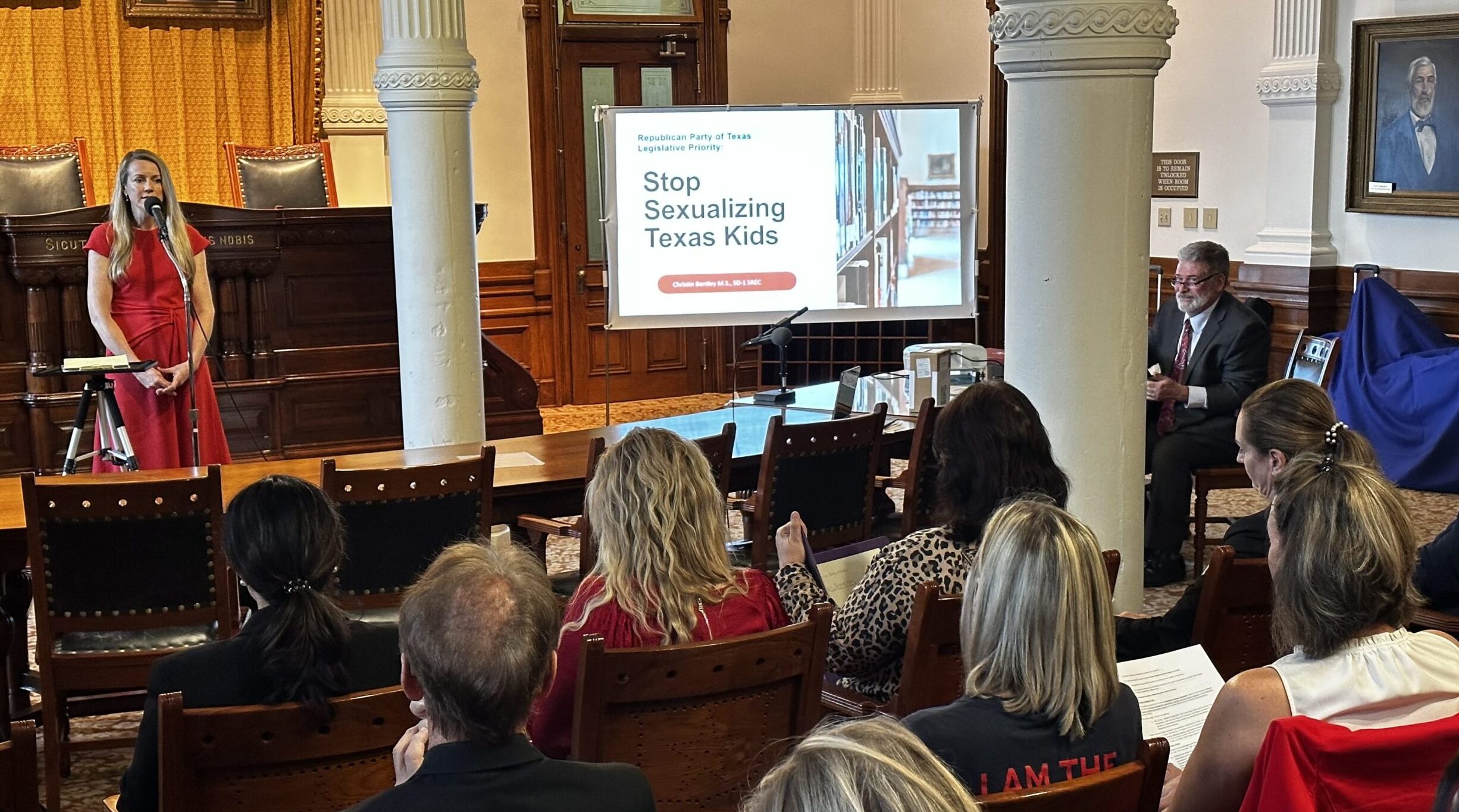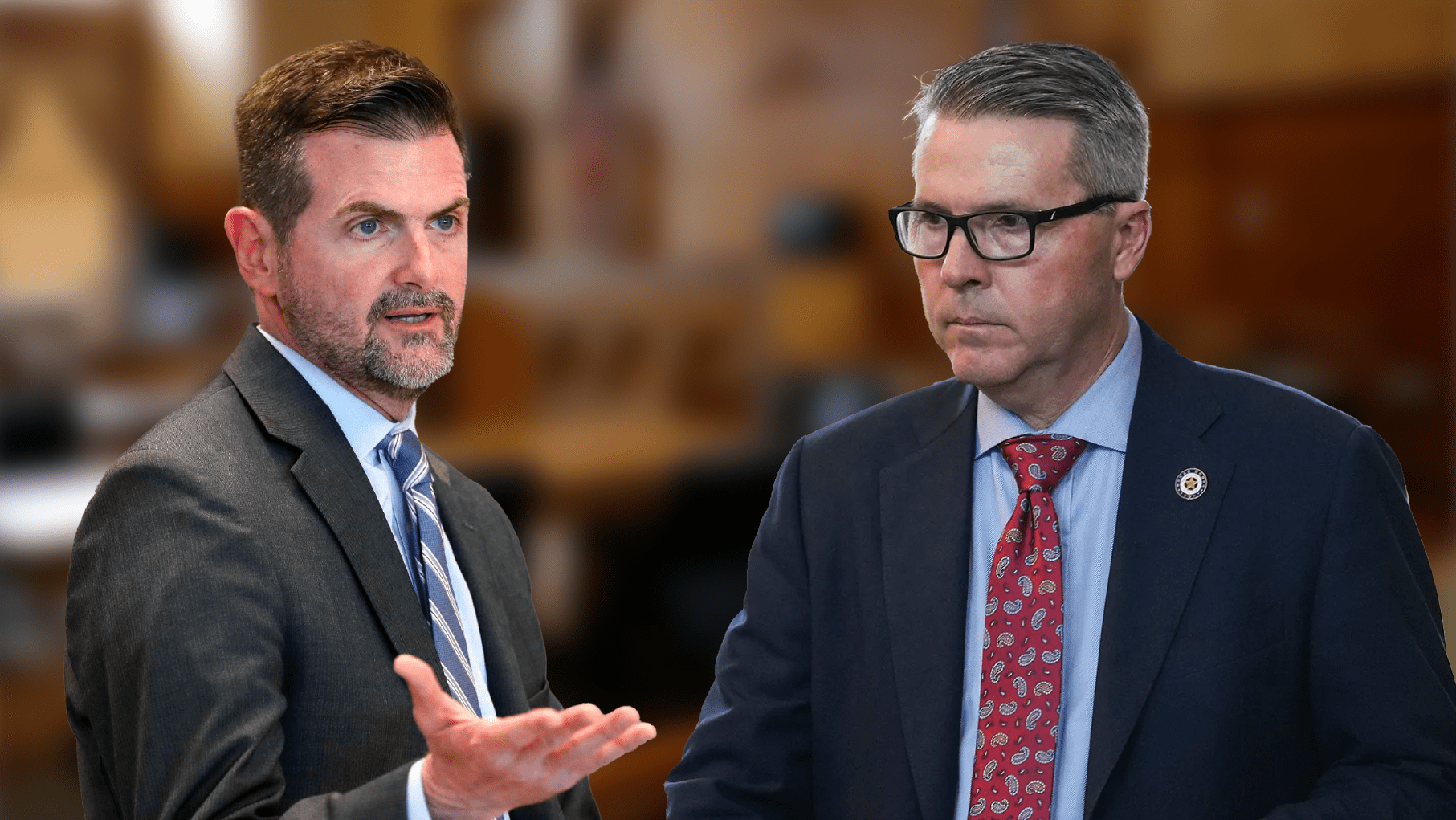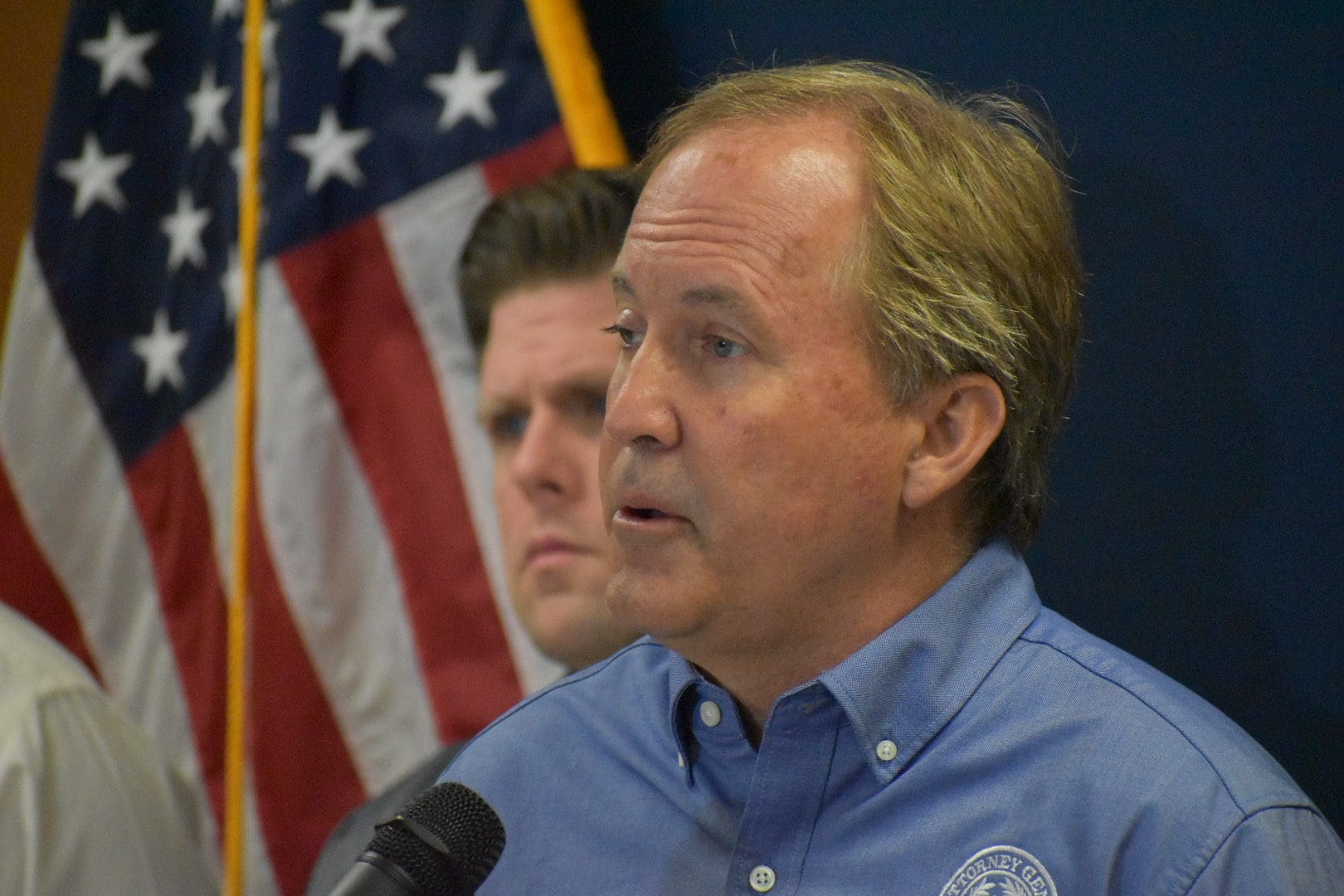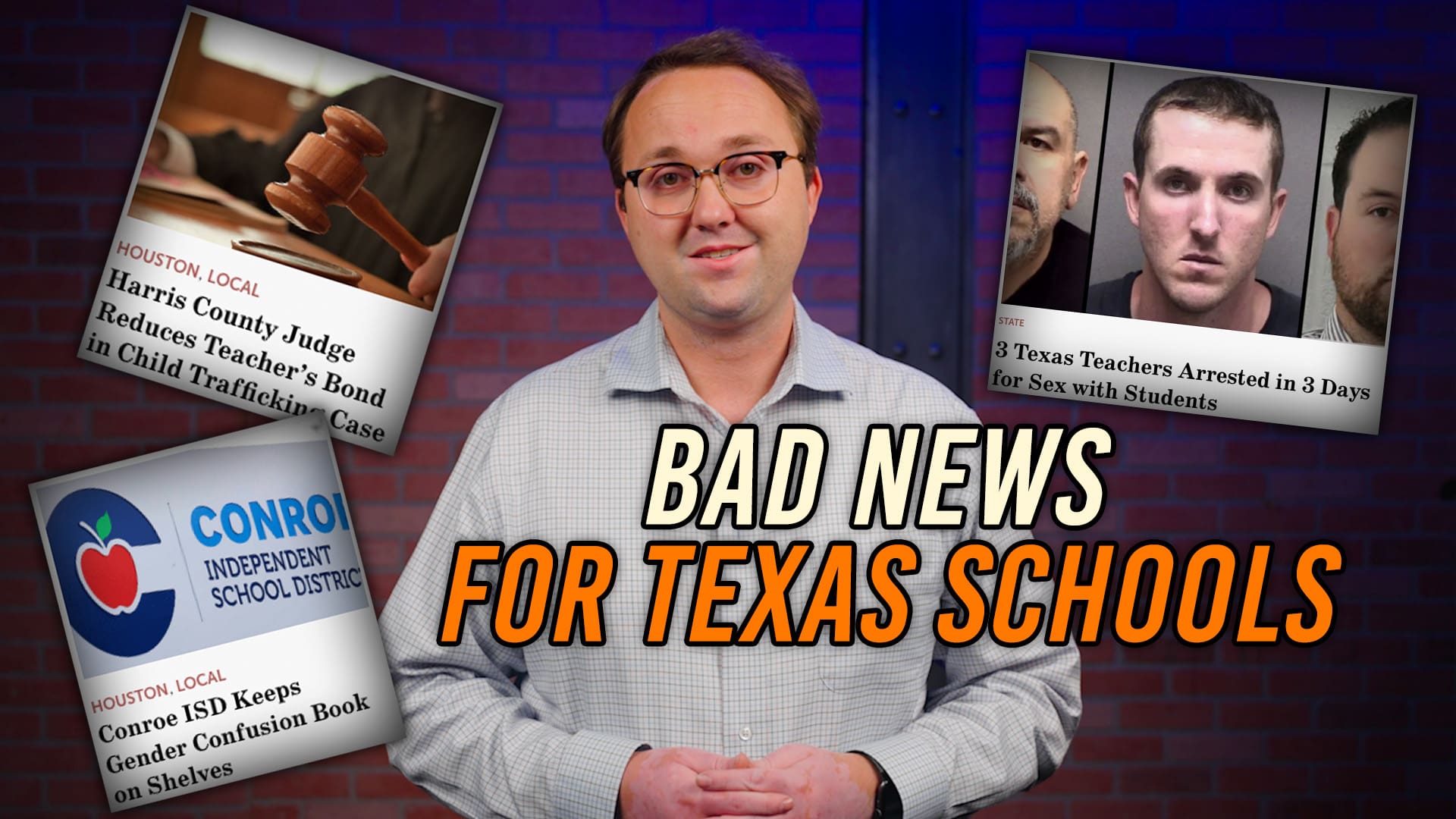Feeding students sexual content in government schools helps sexual predators.
Texas Scorecard has exposed how the state’s government schools are hostile learning environments in this investigative series.
Part one exposed long-running patterns in government schools across the state of predators employed by these schools preying on minors while school districts ignored red flags.
Part two examined multiple papers warning about the increasing problem of predators in schools.
Part three interviewed multiple attorneys on the accountability gap between government and private schools, with the former enjoying more protections than the latter.
In this final chapter, Texas Scorecard will examine the connection between sexual material in government schools and the problem of predators.
Correlations
As of May 24, 2023, both the Texas Senate and Texas House had passed the Restricting Explicit and Adult-Designated Educational Resources (READER) Act. This proposed law sought to keep sexually explicit books out of government schools. Gov. Greg Abbott signed it a few weeks later. It is now law as of September 1, 2023, but is facing legal challenges from book vendors.
This came after parents’ hard-fought, grassroots campaign to clean out filth from the school libraries their taxes paid for. A Texas mom and education advocate, Christin Bentley, led the fight with her “Filthy Books” campaign starting in February 2023. It exposed to state lawmakers and Texans the sexually explicit content parents were finding in the libraries of government schools that they pay taxes for and send their kids to.
As of June 2022, Bentley and others had already successfully pushed the Tyler Independent School District to remove sexually explicit books from its library. She expanded this clean-up service statewide with her “Filthy Books” campaign. She joined forces with State Rep. Jared Patterson (R–Frisco), who responded to parents’ objections over what they found in his district.
Her audit of the Tyler ISD library took “months.” She was able to find 300 sexually explicit books. “When I’m referring to sexually explicit materials, whether it’s depictions through drawings or through writing, these are books and depictions that don’t leave anything to the imagination,” Bentley told Texas Scorecard. “One of them, ‘All Boys Aren’t Blue,’ … it is so sexually explicit. It promotes watching pornography and normalizes watching [it], which a lot of these books do.”
There are multiple reasons why public servants filling government schools with these materials is both disturbing and dangerous.
Encouraging children to watch pornography is leading them to harm, according to Harold Boggs, a marriage and family therapist and certified addiction counselor out of Sugar Land, Texas. “Gambling, porn, alcohol, it’s all the same thing. It attacks the human brain, and when we abstain, it takes different amounts of time for different substances to leave and for the brain to rewire,” he previously told Texas Scorecard in our investigative report on gambling. He said it takes about five months for the human brain to recover from pornography viewing. “There’s an exact linear relationship between the availability and the seriousness of the problems people are having.”
There’s another aspect as well. Government schools making sexually explicit material available empowers predators both within and outside the school.
“I think when you look at the sexualized nature of books and things that are being brought into the school districts, I’m against it, 100 percent,” said David McClelland, former chief of staff for Tarrant County Sheriff Bill Waybourn (R). “I think all it does is aid somebody in their grooming attempts. I think it’s used to help desensitize children, which is never good.”
Bentley agrees. “Absolutely a teacher who is a predator, who does not have sexual boundaries, or who is a predator or a pedophile, could absolutely use the books that are in there and promote them to children,” she said. “It definitely speaks to another reason why the books wouldn’t be there in the first place.”

Christin Bentley speaking against the sexualization of children.
Brady Gray, president of Texas Family Project, concurs. “You now have children who are not mature enough, they don’t have the capacity to necessarily understand all of these things that they’re being inundated with. That is how these groomers work,” he told Texas Scorecard. “That’s how they work is they teach these children these specific things. They teach them that this is okay, and this is natural, and this is fun.”
Gray drew upon his knowledge of his friend’s ministry rescuing sex slaves in India to describe how this can warp a child’s world. “He said it’s really difficult because these kids have been sold into sex slavery, some of them as young as one and two years old, and it’s all they’ve ever known. For them, much of this is just some sort of game that they don’t even fully understand,” he said.
He made the connection between that and what’s occurring in Western society and Texas:
“We’re seeing young kids be taught not just about sex, but about this completely ridiculous concept of gender identity, and being forced to be the other gender and being taught to be the other gender.”
Gray said children are getting this not only from the society around them, and companies like Disney, but also in schools.
There appears to be a correlation between predation and pornographic materials flooding Western culture like open sewers. “Based off my opinion, and based off what I’ve seen, I think the over-sexualization of society is definitely a driving factor behind what we’re dealing with,” said Commander Kevin Turner of Tarrant County’s Human Trafficking Task Force. “Seeing the ease of which pornography can be accessed now, and these individuals basically being addicted to pornography, and once that pornography does not satisfy them sexually, then they’re more to deal with on a hands-on offense type situation.”
Contaminated System
Here in the “Filthy Books” battle, a common theme in this investigative series resurfaced: the government school system being part of the problem, not the solution.
In March 2022, a bookseller stated that elected school boards are the ones responsible for sexually explicit materials being in government schools.
As the outcry from parents grew, in November 2021 Gov. Greg Abbott asked multiple government bodies to address the problem. One of these bodies was the Texas Education Agency, which oversees all the government school districts. In April 2022, the TEA issued new guidelines that ostensibly would maximize transparency and empower parents.
Bentley said TEA was less than useful.
“They didn’t give any direction really on sexually explicit materials,” she told Texas Scorecard. “What they did in their ES local policy is reiterate that harmful materials, in our penal code, are illegal to distribute to children.”
The fact that state lawmakers acted in the 2023 regular session indicates that the TEA, and school boards, did not do enough to fix the “Filthy Books” problem.
The System Strikes Back
Rather than join the fight to make schools safe again, government education supporters fought against Texans’ efforts to sanitize school libraries. They framed these efforts to protect children as an attack on the government school system.
“This session has been marked by attacks on public education and teachers that were clearly designed to damage public confidence in the most important institution this state has going for it – our public school system,” Clay Robison, Public Affairs Specialist for The Texas State Teachers Association, wrote on May 2, 2023. “The Texas Republican Party raises campaign money with anti-public education emails carrying subject lines such as ‘Filthy Books’ or ‘Don’t let schools exploit our kids!’ and urging recipients to tell their legislators to ‘stop the perversion and sexualization of our children.’ Public schools and the people who work in them are not trying to ‘exploit’ children. They are trying to educate them and prepare them for successful futures.”
Robison went on to claim Gov. Greg Abbott “wrongly” suggested “pornography was widespread in public school libraries, eventually citing only one or two LGBTQ books as examples.”
“Then he ordered a statewide investigation, without noting that most school districts already had policies in place to review such books if parents had complaints about them,” Robison wrote. “His pornography pronouncement defamed school librarians and subjected school boards to attacks from angry and mostly misinformed parents.”
Bentley countered Robison’s claims. She found that Tyler ISD’s library was “kind of like just the other schools across the state that have books that are just completely pornographic in nature.” She also found that these books engage in grooming. “[They] just go into great detail about sexual acts that just leave absolutely nothing to the imagination that are vulgar, use vulgar language, and depict sex between minors and adults,” she told Texas Scorecard. “I have a master’s degree in special education, but I do love to say it doesn’t take a master’s degree to know that these filthy books don’t belong in the hands of children.”
Even the U.S. Federal Government came riding to defend Texas government schools from outraged parents. In December 2022, The Associated Press reported the U.S. Department of Education was investigating the removal of “LGBTQ-themed books” in Granbury ISD. The federal agency framed the book removals as an attack on civil rights, rather than protecting children from explicit materials.
However, according to Commander Turner, images are a part of the grooming process of predators. First, they work to gain the confidence of a child. Then they may ask for the child to send a fully clothed photo of himself or herself. “Once the child is in a position where they feel they can start asking for more aggressive things, more lewd photos—and it really only takes that one time—once that individual has that one photo of that child, that’s when they use that as the premise to basically coerce them into continue to do it.”
Demanding Money
Despite being a hostile learning environment for minors, Texas government schools regularly demand more taxpayer monies from state lawmakers. And just as regularly, they get it. According to data from the Huffines Liberty Foundation, from 2021 to 2023, state lawmakers upped state taxpayer funding of K-12 education and higher education by more than $9 billion, or 12.4 percent.
Part two of Texas Scorecard’s investigative series “2 Texases” examined the wealthy salaries of those in government education that taxpayers are funding. This contrasts with the livelihoods of taxpayers who are struggling to make ends meet.
Tim Hardin, President of Texans for Fiscal Responsibility, doesn’t believe government schools are entitled to regular funding increases so long as they remain hostile learning environments. “This is a problem with a monopoly in Texas: there [are] no other options for the vast majority of Texans who are not wealthy, who don’t have the money to pay $10,000 a year in tuition for a private school. There is no real school choice in Texas. When you have a mafia, which is exactly what the government schools are, there’s no repercussions,” he said. “They can essentially do whatever they want, whenever they want, and there’s not really any fear of pulled funding, or even salaries getting lowered. There’s hardly any accountability whatsoever in government schools, and it’s a shame.”
As discussed in part three of this series, multiple attorneys have complained of the difficulty in holding government schools accountable for predators within them through lawsuits. Hardin pointed out that government schools are obsessed with money. “That’s all they focus on. There’s no other focus. They’re certainly not focusing on educational outcomes, because we’re some of the worst in the entire nation,” he said. “We give them more money every single cycle and outcomes don’t improve.”
Hardin believes school choice is something that’s needed to help address the issue. “It’s a systemic problem. Yes, people should be able to sue for damages if bad things have occurred to the children. But I would say that in and of itself is not going to solve the problem,” he explained. “All that’s really going to do is cause more financial woes, and then public education [will] ask for even more money, and it will be this vicious cycle of wasting taxpayer dollars. You have to deal with a systemic problem, And that’s going to only be dealt with [by] school choice, in my opinion.”
As noted in the Boston Globe investigation of the Archdiocese of Boston pedophile priest scandals this series has referenced, victims sued in a quest to hold a corrupt system accountable.
Conclusion
For years, Texas government schools have been hostile learning environments for children, while being relatively safe environments for predators. These schools brought pornographic materials into these institutions, exposed children to more danger, and empowered predators both within the school and society at large. These schools have a toxic culture which shuns accountability and transparency, while making it easy to succumb to temptation.
Too often when school districts have become aware of a problem, or see red flags, they ignore it. They protect the system rather than the student.
“I don’t even know that people necessarily, intentionally, consciously realize that they are protecting the machine or the district at all costs,” education specialist Dr. Kris Kittle, of Keller, told Texas Scorecard. “I think that they’re just thinking that if they make sure that the district is protected, then they’re doing the right thing … because they don’t want the district to get a bad name. I think that’s what they think, instead of realizing that in doing so, they’re actually harming the students. The whole purpose of education is supposed to educate students. Students should be number one.”
Dr. Charol Shakeshaft, a specialist in the study of Educator Sexual Misconduct from Virginia Commonwealth University, outlined to Texas Scorecard the reasons why schools may hide or fail to properly address cases of Educator Sexual Misconduct. Schools value the comfort and reputation of adults (teachers, coaches etc.) over the safety of children. Administrators want to avoid scandals or being seen as admitting something is wrong with their school. Complaints are often dismissed or investigations are not properly conducted to avoid consequences for lack of supervision or accountability. Schools worry more about impacts to budgets, insurance costs or jobs rather than prioritizing student protection. Finally, there is a culture of overlooking misconduct to maintain a public image rather than confronting the problem openly and making required reforms.
In other words, schools are more concerned about how they look than in the welfare of their students, or serving parents.
As a result of these indefensible actions, a lack of trust continues to grow in government schools. “I don’t trust government schools whatsoever. Teachers need to be properly vetted. Parents need to know who the heck their teacher is—their whole background—And they need to know what’s going on in the classroom,” said Fort Worth activist Carlos Turcios. “The teacher unions in the left wing industrial complex. They don’t want that [list of changes], because the minute you do that they lose political power.”
Turcios has worked with other local activists in trying to hold Fort Worth ISD accountable. He has previously discussed how the district has resisted efforts to remove Critical Race Theory and controversial gender theory.
Thanks to Bentley, Turcios, and other Texans, government school districts like Fort Worth ISD scrambled to come into compliance with the new ban on sexually explicit materials.
However, the fight to protect children isn’t over. Powerful special interests have joined forces to keep these dangerous materials in government schools. In July 2023, it was widely reported that establishment publishers, booksellers, and authors filed a lawsuit to stop the READER Act.
Predators in government schools also continue to be a problem. On August 16, a Houston ISD teacher was arrested for sending nude photos to 14-year-olds.
What can be done to change the system and clean up government schools?
“I think that we need to have more accountability, and that’s been a very difficult thing to achieve, because there isn’t really a civil kind of avenue of enforcement,” Bentley said.
Citizens currently have a grievance process they can pursue regarding government schools, but Bentley described it as pointless. “It is not at all in favor of a parent who’s going through that process, and the TEA does not have a very good record at resolving complaints,” Bentley said. “I think that the TEA doesn’t have the trust of parents in Texas, at all, unfortunately.”
Texas Scorecard asked the chairs of the education committees in the Texas Senate and House for comment about private schools being easier to sue in these matters rather than government schools. Neither State Rep. Brad Buckley (R–Salado) nor State Sen. Brandon Creighton (R–Creighton) replied before publication. Creighton has been championing school choice. Buckley stalled it in the Texas House until the last minute, and only then pushed a watered down version that Gov. Greg Abbott criticized.

Left to Right: State Sen. Brandon Creighton, State Rep. Brad Buckley.
“In other states, you don’t have to go through this grievance process,” Bentley continued. “In other states, you can file a lawsuit. In Texas, we don’t have that option in most cases.” Part three of this series examined the difficulty in a victim’s ability to hold a government school accountable through a civil lawsuit versus a private school. Dr. Charol Shakeshaft said payments to victims that are required to be come out of a school’s budget rather than through insurance, with settlement requirements that the school district undergo training and reforms, could help address the problem of Educator Sexual Misconduct in government schools. Overall, she thinks lawsuits can help, but stronger accountability measures are still needed.
It’s important to remember what the problem is. If the problem is misdiagnosed, citizens and public servants will waste energy treating symptoms and ignoring the disease. The problem in government schools, and any school system where sexual abuse occurs, is a cultural one. Until the culture is fixed, the problem will continue. If the culture is changed, it may not zero out abuse entirely, but it could significantly reduce it.
Shakeshaft outlined to Texas Scorecard recommendations to help change it. First, retraining all school staff to understand appropriate boundaries and recognize red flags. Second, increasing supervision of staff and students to enforce boundaries. Third, establishing accountability measures like following up on complaints and imposing consequences for boundary violations. Fourth, creating a culture through training, policies, and transparency where people feel comfortable reporting concerns, and where misconduct will not be tolerated. Finally, using programs and training shown to be effective, not just minimal efforts.
She stressed the importance of training, transparency around the issue, and real accountability in order to fix the underlying cultural problems that have allowed misconduct to persist.
Shakeshaft has been shocked over school reluctance to undergo such training, even when federal taxpayers are footing the bill. “There are really good trainers out there; there are programs out there that are really good for schools. For instance, I have a federal grant from the Centers for Disease Control to study what we rated as the best program in the country. We’ve asked schools to be involved in the study, which means they get the training free. So thousands and thousands and thousands of dollars of training is free if they’ll do it. All they have to do is fill out a survey, take the training, fill out another survey, and some of the administrators get interviewed,” she said. “Schools won’t do it. Too busy, afraid, don’t want to get involved … I can’t understand why, with the problem this big, when they’re being offered the best of the best training for free, they just can’t do it.”
Texas Scorecard asked Tim Hardin what it means if state lawmakers will not act on the predator problem in government schools. “It tells you who they are, and it tells you why they run for office. It’s certainly not to be a public servant. It’s to serve themselves,” he said. “There’s a difference between rhetoric and actually doing something.”
Source Document
Texas Scorecard reviewed an analysis by the Huffines Liberty Foundation of spending increases in the state budget between 2021 and 2023 for education.
Citizens wishing to conduct a deeper dive are encouraged to click the link.





